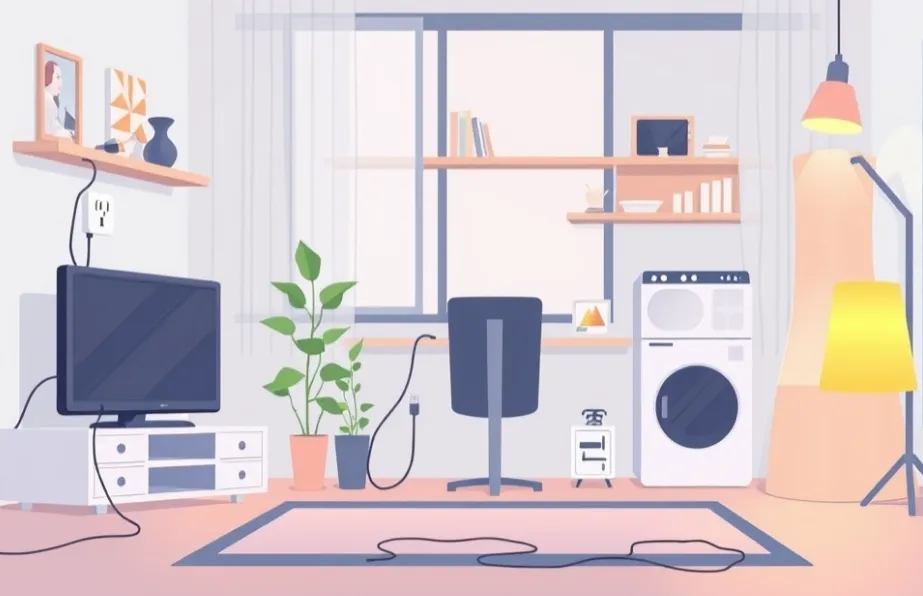Table of Contents

In the age of modern technology, reliance on electrical devices has become an unavoidable part of our daily lives. As many prepare to go on vacations and enjoy time off, there is one simple step that should be taken into consideration: unplugging electrical devices. This task may seem trivial, but it has significant implications for personal safety, resource conservation, and cost savings.
Costs Associated with Connected Devices
According to the U.S. Department of Energy, unplugged household devices contribute significantly to energy consumption even when not in use. Many appliances, such as televisions, computers, and gaming systems, continue to draw electricity while in standby mode, which increases household bills. Therefore, unplugging these devices before leaving is a smart step that helps to reduce expenses.
Risks Associated with Connected Devices
In addition to increased costs, leaving electrical devices plugged in can lead to serious safety hazards. Data from the National Fire Protection Association reports approximately 23,700 home fires caused by electrical devices in 2023 alone, resulting in 305 fatalities and causing damages exceeding $1.5 billion. These figures emphasize the importance of unplugging electrical devices when leaving home for an extended period.
What to Unplug When Leaving Home
1. Televisions, Gaming Systems, and Computers
These devices are among the largest energy consumers. Even when turned off, they remain plugged in and draw power in standby mode, leading to unnecessary energy wastage. In addition to saving money, unplugging these devices reduces the risk of malfunction or damage.
2. Small Kitchen Appliances
This category includes toasters, blenders, microwaves, and coffee makers. We may overlook the importance of unplugging these appliances, but they can become sources of unnecessary energy consumption. Additionally, they may be at risk of damage or malfunction if left plugged in for extended periods.
3. Personal Grooming Tools
This category includes devices such as hair dryers, curling irons, and straighteners. These tools can pose potential fire hazards, so it’s vital to unplug them after use or before leaving the house.
4. Lamps and Lights
While some may think leaving the lights on makes the home look occupied, leaving lights plugged in for long periods can be hazardous. It’s better to turn off and unplug lamps to avoid energy consumption and reduce fire risks.
5. Space Heaters
Space heaters contribute to a significant number of home fires, being associated with over 1,000 incidents annually. Therefore, it’s crucial to unplug them when leaving home for extended periods.
6. Electric Blankets
Studies indicate that electric blankets, especially older models, are involved in over 500 home fires each year. Thus, it’s essential to ensure they are unplugged when not in use.
7. Washing Machines and Dryers
Even if these devices do not consume a lot of energy, unplugging them can reduce the risk of malfunctions. It’s always advisable to unplug them when leaving home for an extended time.
What to Keep Plugged In
While many electrical devices should be unplugged, there are some that should remain plugged in to ensure the safety of the home:
1. Refrigerator and Freezer
This is the most obvious choice, as the refrigerator and freezer must remain plugged in to keep food safe. The refrigerator’s temperature can be set to energy-saving modes, but it should stay connected.
2. Smoke Detectors and Carbon Monoxide Alarms
These devices are essential for home safety. They should remain plugged in throughout your absence to ensure they function properly in case of an emergency.
3. Security Systems and Smart Devices
Security systems, cameras, and smart devices are crucial for protecting the home. These devices stay plugged in to monitor activity inside the house, providing peace of mind for families while they travel.
Environmental Impact of Unplugging Electrical Devices
Unplugging electrical devices not only safeguards your home and saves money but also contributes positively to the environment. By reducing energy consumption, we decrease the demand for electricity generated from fossil fuels, thereby lessening carbon emissions associated with energy production. This small action can collectively lead to significant changes in our carbon footprint and promote a more sustainable future.
In conclusion, unplugging electrical devices before leaving home is not just an act of caution; it is an effective step towards promoting sustainability and environmental conservation. By reducing energy consumption, lowering carbon emissions, and minimizing waste, we can make a positive impact in our daily lives. As you plan your next trip, remember that unplugging can have a bigger effect than you might think. Protect your home, save money, and contribute to a sustainable future for generations to come.
